Platforms
Maryland Genomics occupies custom-designed BSL-2 research space within the University of Maryland's Health Sciences Research Facility III, a state-of-the art research laboratory completed in 2018. We have equipped the laboratory with custom-built laboratory automation platforms to increase efficiency, reduce error, and increase throughput. We utilize a customized Laboratory Information Management System (LIMS) for reagent, sample, and project tracking. The LIMS increases efficiency and reduces errors through the use of custom workflows for each platform. These workflows provide process control and validation to ensure each sample is processed according to established and reviewed protocols. Our custom-designed facility, automation platforms, and LIMS support our high-throughput sequencing pipelines.
Illumina
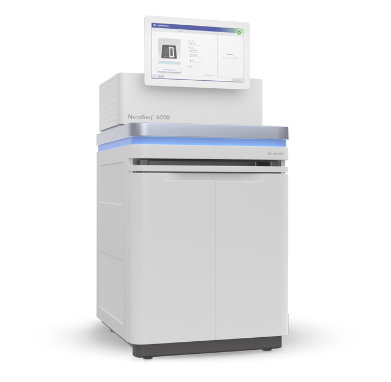 Illumina sequencing technology has become the most widely adopted next-generation sequencing platform. Illumina sequencers provide high-throughput, short-read sequence data with the lowest cost-per-base of any commercially available platform. The technology uses sequencing-by-synthesis on a glass surface (flowcell) to produce billions of reads per run with read lengths up to 300bp and growing. This platform enables many applications, including whole genome sequencing, exome and custom targeted sequencing, transcriptome sequencing, epigenomic sequencing, and others. We operate several types of Illumina sequencers: MiSeq, NextSeq 550Dx , NextSeq 1000, and the flagship NovaSeq 6000. A single 2 day NovaSeq 6000 dual S4 flowcell run can generate sufficient data to sequence 48 human genomes, more than 500 human exomes, more than 400 human transcriptomes, or thousands of microbial genomes.
Illumina sequencing technology has become the most widely adopted next-generation sequencing platform. Illumina sequencers provide high-throughput, short-read sequence data with the lowest cost-per-base of any commercially available platform. The technology uses sequencing-by-synthesis on a glass surface (flowcell) to produce billions of reads per run with read lengths up to 300bp and growing. This platform enables many applications, including whole genome sequencing, exome and custom targeted sequencing, transcriptome sequencing, epigenomic sequencing, and others. We operate several types of Illumina sequencers: MiSeq, NextSeq 550Dx , NextSeq 1000, and the flagship NovaSeq 6000. A single 2 day NovaSeq 6000 dual S4 flowcell run can generate sufficient data to sequence 48 human genomes, more than 500 human exomes, more than 400 human transcriptomes, or thousands of microbial genomes.
PacBio
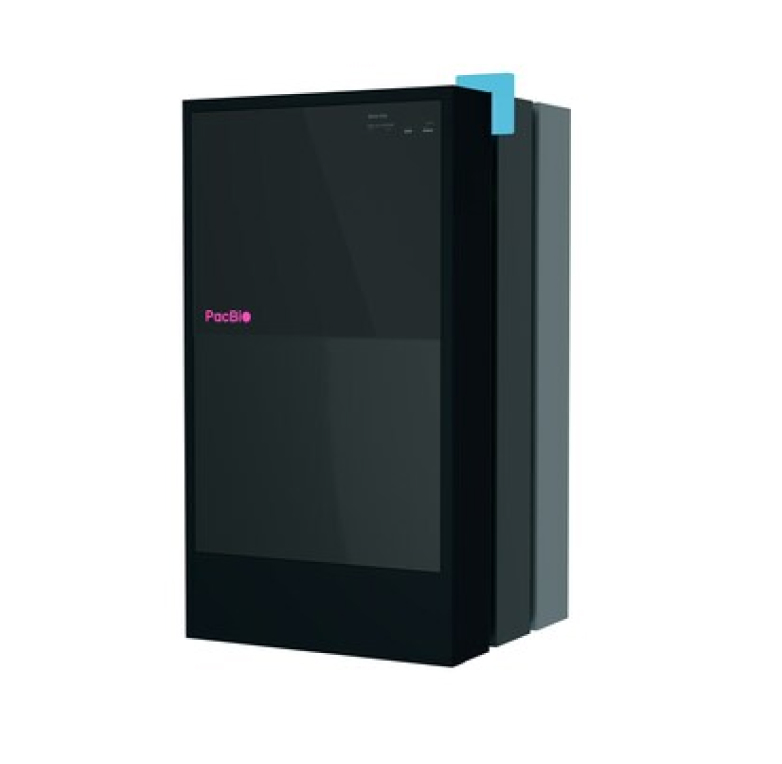 Pacific Biosciences (PacBio) is a single-molecule, real-time (SMRT) sequencing technology capable of detecting signal from an individual DNA molecule coupled with an individual DNA polymerase. It achieves the highest accuracy and throughput of any currently available long-read sequencing technology and is free of amplification artifacts that can confound other sequencing technologies.
Pacific Biosciences (PacBio) is a single-molecule, real-time (SMRT) sequencing technology capable of detecting signal from an individual DNA molecule coupled with an individual DNA polymerase. It achieves the highest accuracy and throughput of any currently available long-read sequencing technology and is free of amplification artifacts that can confound other sequencing technologies.

We are a PacBio Certified Service Provider and beta site for new applications. With a mean read length greater than 20,000 bases and >120 billion bases of HiFi long reads generated per SMRT Cell run using the latest SPRQ chemistry, the PacBio platform enables many applications not possible with other technologies. The Revio System is capable of generating up to 40x long-read HiFi genome coverage in a single sequencing run! The reaction kinetics data collected during the run can be used to natively detect modified nucleotides for epigenomic applications. Some applications ideally suited for this platform include de novo genome sequencing, metagenome sequencing, variant detection and validation, methylation analysis, targeted/amplicon sequencing, and full-length transcript/cDNA sequencing (Kinnex/Iso-Seq).
10x Genomics
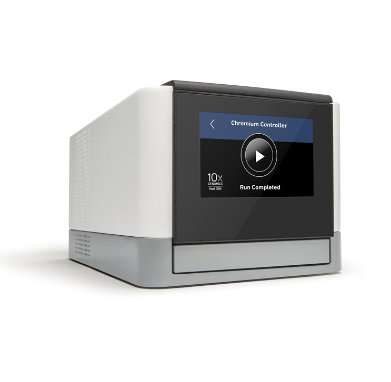 The 10x Genomics Chromium X instruments utilized by Maryland Genomics are the most widely used commercial single-cell microfluidics systems in the world. Capable of capturing tens of thousands of single cells per sample, the technology enables both transcriptome and epigenome scale sequencing at the single cell level. Applications include gene expression profiling, chromatin accessibility assays (ATAC-Seq), immune profiling, cell surface protein profiling, and more!
The 10x Genomics Chromium X instruments utilized by Maryland Genomics are the most widely used commercial single-cell microfluidics systems in the world. Capable of capturing tens of thousands of single cells per sample, the technology enables both transcriptome and epigenome scale sequencing at the single cell level. Applications include gene expression profiling, chromatin accessibility assays (ATAC-Seq), immune profiling, cell surface protein profiling, and more!
Using the 10x Genomics CytAssist instrument, the Visium HD assay enables spatial single-cell scale resolution transcriptome sequencing and profiling of up to 4 tissue sections per run and is compatible with FFPE, fresh frozen, and fixed frozen samples.
Bruker Spatial Biology (formerly Nanostring)
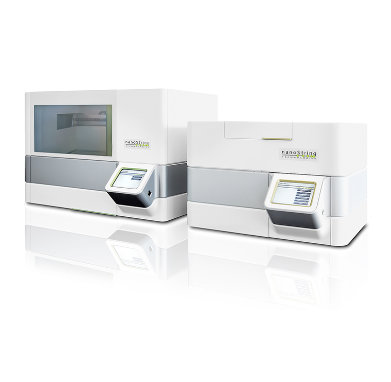 The flagship CosMx Spatial Molecular Imager is a high-resolution, high-plex in situ spatial multi-omics platform that supports quantification and visualization of up to 6,000 RNA targets and 64 protein targets at a cellular and sub-cellular level. Supporting both FFPE and fresh frozen tissue sections on up to 4 slides per run, the platform is ideal for cell atlasing, tissue phenotyping, cell-cell interactions, and biomarker discovery.
The flagship CosMx Spatial Molecular Imager is a high-resolution, high-plex in situ spatial multi-omics platform that supports quantification and visualization of up to 6,000 RNA targets and 64 protein targets at a cellular and sub-cellular level. Supporting both FFPE and fresh frozen tissue sections on up to 4 slides per run, the platform is ideal for cell atlasing, tissue phenotyping, cell-cell interactions, and biomarker discovery.
The NanoString nCounter Analysis System digitally quantifies up to 800 DNA, RNA, and protein targets using a single detector from samples of limited volume and concentration without the need for amplification or library preparation. The nCounter’s digital counting capability provides highly reproducible data over 5 logs of dynamic range and does not require any amplification steps that might introduce bias to the results. An additional advantage of nCounter chemistry is that it is highly tolerant of difficult sample types such as FFPE and crude-cell lysates. With a technology that expands our capabilities and complements our high-throughput sequencing platforms, we are excited to have the NanoString nCounter join our growing family of services.
Oxford Nanopore
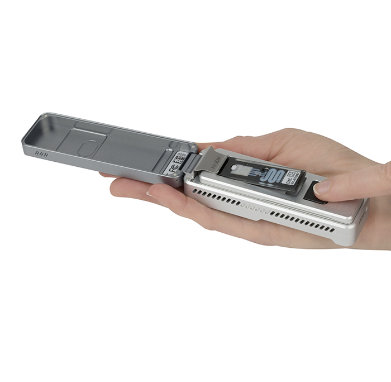 The Oxford Nanopore MinION is the world's first nanopore DNA sequencer. It is a portable, low-cost, long-read sequencing device that has proven disruptive to the sequencing landscape. Its strengths include its portability, rapid run results, and capability for ultra-long read lengths.
The Oxford Nanopore MinION is the world's first nanopore DNA sequencer. It is a portable, low-cost, long-read sequencing device that has proven disruptive to the sequencing landscape. Its strengths include its portability, rapid run results, and capability for ultra-long read lengths.

